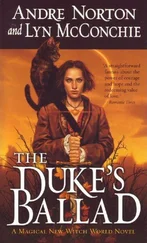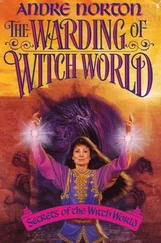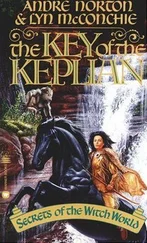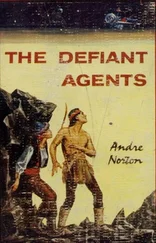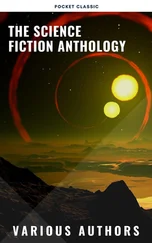We fought every step of the way, in a fog of reddish dust from the big disintegrator rays playing on either side of us—but we made it, a torn, weary, and bedraggled crew.
“Quite an engagement, sir,” gasped Correy, when we were safely inside the Ertak . “Think they’ll remember this little visit of ours, sir?”
“I know we’ll remember it, anyway,” I said, shaking some of the dust of disintegration from my clothes. “Just at the moment, I’d welcome a tour of routine patrol.”
“Sure, sir,” grinned Correy. “So would I—until we were a day or two out from Base!”
Song in a minor key, by C.L. Moore
BENEATH him the clovered hill-slope was warm in the sun. Northwest Smith moved his shoulders against the earth and closed his eyes, breathing so deeply that the gun holstered upon his chest drew tight against its strap as he drank the fragrance of Earth and clover warm in the sun. Here in the hollow of the hills, willow-shaded, pillowed upon clover and the lap of Earth, he let his breath run out in a long sigh and drew one palm across the grass in a caress like a lover’s.
He had been promising himself this moment for how long—how many months and years on alien worlds? He would not think of it now. He would not remember the dark spaceways or the red slag of Martian drylands or the pearl-gray days on Venus when he had dreamed of the Earth that had outlawed him. So he lay, with his eyes closed and the sunlight drenching him through, no sound in his ears but the passage of a breeze through the grass and a creaking of some insect nearby—the violent, blood-smelling years behind him might never have been. Except for the gun pressed into his ribs between his chest and the clovered earth, he might be a boy again, years upon years ago, long before he had broken his first law or killed his first man.
No one else alive now knew who that boy had been. Not even the all knowing Patrol. Not even Venusian Yarol, who had been his closest friend for so many riotous years. No one would ever know—now. Not his name (which had not always been Smith) or his native land or the home that had bred him, or the first violent deed that had sent him down the devious paths which led here—here to the clover hollow in the hills of an Earth that had forbidden him ever to set foot again upon her soil.
He unclasped the hands behind his head and rolled over to lay a scarred cheek on his arm, smiling to himself. Well, here was Earth beneath him. No longer a green star high in alien skies, but warm soil, new clover so near his face he could see all the little stems and trefoil leaves, moist earth granular at their roots. An ant ran by with waving antennae close beside his cheek. He closed his eyes and drew another deep breath. Better not even look; better to lie here like an animal, absorbing the sun and the feel of Earth blindly, wordlessly.
NOW HE was not Northwest Smith, scarred outlaw of the spaceways. Now he was a boy again with all his life before him. There would be a white-columned house just over the hill, with shaded porches and white curtains blowing in the breeze and the sound of sweet, familiar voices indoors. There would be a girl with hair like poured honey hesitating just inside the door, lifting her eyes to him. Tears in the eyes. He lay very still, remembering.
Curious how vividly it all came back, though the house had been ashes for nearly twenty years, and the girl—the girl ...
He rolled over violently, opening his eyes. No use remembering her. There had been that fatal flaw in him from the very first, he knew now. If he were the boy again knowing all he knew today, still the flaw would be there and sooner or later the same thing must have happened that had happened twenty years ago. He had been born for a wilder age, when men took what they wanted and held what they could without respect for law. Obedience was not in him, and so—
As vividly as on that day it happened he felt the same old surge of anger and despair twenty years old now, felt the ray-gun bucking hard against his unaccustomed fist, heard the hiss of its deadly charge ravening into a face he hated. He could not be sorry, even now, for that first man he had killed. But in the smoke of that killing had gone up the columned house and the future he might have had, the boy himself—lost as Atlantis now—and the girl with the honey-colored hair and much, much else besides. It had to happen, he knew. He being the boy he was, it had to happen. Even if he could go back and start all over, the tale would be the same.
And it was all long past now, anyhow; and nobody remembered any more at all, except himself. A man would be a fool to lie here thinking about it any longer.
Smith grunted and sat up, shrugging the gun into place against his ribs.
Sentry of the Sky, by Evelyn E. Smith
Clarey had checked in at Classification Center so many times that he came now more out of habit than hope. He didn’t even look at the card that the test machine dropped into his hand until he was almost to the portway. And then he stopped. “Report to Room 33 for reclassification,” it said.
Ten years before, Clarey would have been ecstatic, sure that reclassification could be only in one direction. The machine had not originally given him a job commensurate with his talents; why should it suddenly recognize them? He’d known of people who had been reclassified—always downward. I’m a perfectly competent Sub-Archivist, he told himself; I’ll fight.
But he knew fighting wouldn’t help. All he had was the right to refuse any job he could claim was not in his line; the government would then be obligated to continue his existence. There were many people who did subsist on the government dole: the aged and the deficient and the defective—and creative artists who refused to trammel their spirits and chose to be ranked as Unemployables. Clarey didn’t fit into those categories.
Dispiritedly, he passed along innumerable winding corridors and up and down ramps that twisted and turned to lead into other ramps and corridors. That was the way all public buildings were designed. It was forbidden for the government to make any law-abiding individual think the way it wanted him to think. But it could move him in any direction it chose, and sometimes that served its purpose as well as the reorientation machines.
So the corridors he passed through were in constant eddying movement, with a variety of individuals bent on a variety of objectives. For the most part, they were of Low Echelon status, though occasionally an Upper Echelon flashed his peremptory way past. Even though most L-Es attempted to ape the U-E dress and manner, you could always tell the difference. You could tell the difference among the different levels of L-E, too—and there was no mistaking the Unemployables in their sober gray habits, devoid of ornament. It was, Clarey sometimes thought when guilt feelings bothered him, the most esthetic of costumes.
The machine in Room 33 extracted whatever information it was set to receive, then spewed Clarey out and sent him on his way to Rooms 34, 35, and 36, where other machines repeated the same process. Room 37 proved to be that rare thing in the hierarchy of rooms—a destination. There was a human Employment Commissioner in it, splendidly garbed in crimson silvet and alexandrites—very Upper Echelon, indeed. He wore a gold mask, a common practice with celebrities who were afraid of being overwhelmed by their admirers, an even more common practice with U-E non-celebrities who enjoyed the thrill of distinguished anonymity.
Then Clarey stopped looking at the Commissioner. There was a girl sitting next to him, on a high-backed chair like his. Clarey had never seen a U-E girl so close before. Only the Greater Archivists had direct contact with the public, and Clarey wasn’t likely to meet a U-E socially, even if he’d had a social life. The girl was too fabulous for him to think of her as a woman, a female; but he would have liked to have her in his archives, in the glass case with the rare editions.
Читать дальше

